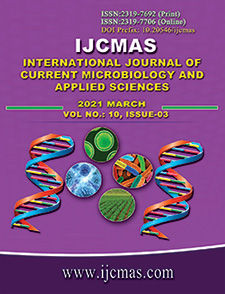


 National Academy of Agricultural Sciences (NAAS)
National Academy of Agricultural Sciences (NAAS)

|
PRINT ISSN : 2319-7692
Online ISSN : 2319-7706 Issues : 12 per year Publisher : Excellent Publishers Email : editorijcmas@gmail.com / submit@ijcmas.com Editor-in-chief: Dr.M.Prakash Index Copernicus ICV 2018: 95.39 NAAS RATING 2020: 5.38 |
Chickpea (Cicer arietinum L.) is the third most important pulse crop of the world grown in semi- arid and tropical climate. It belongs to family Fabaceae. The major losses in chickpea yield are attributed mainly due to soil borne pathogens. Among them the dry root rot (DRR) caused by Rhizoctonia bataticola has become a major threat to chickpea production in recent years. An experiment was conducted in the Rabi season to check the efficacy of botanicals and Trichoderma viride against Rhizoctonia bataticola on field conditions. Three types of botanicals viz., Neem oil, Castor oil, Clove oil and one bio-agent viz., Trichoderma viride was selected @ 5% concentration as seed treatment. An untreated replication served as control. At desired number of days readings were taken for growth parameters and disease incidence. On the basis of single trail, it was observed that among all treatments seed treatment with Neem oil @2.5% + Trichoderma viride @ 2.5% showed the most significant results. Subsequently the highest incremental cost benefit ratio was obtained with treatment of Neem oil @2.5% + Trichoderma @2.5%.
 |
 |
 |
 |
 |